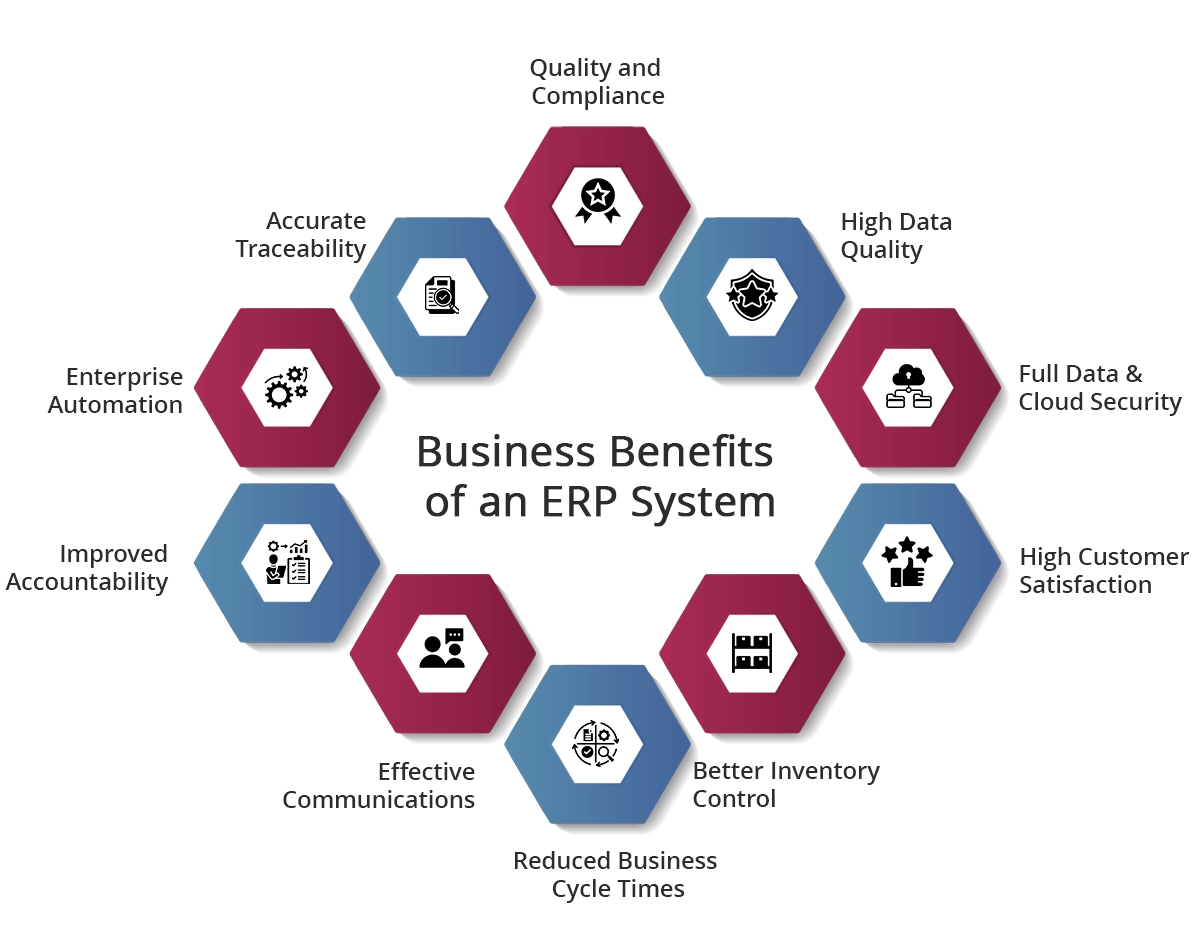What is the ERP System?
An ERP System offers a plethora of benefits to businesses by which they can manage varied business operations effectively. With it, you can also streamline different business functions and can improve business standards with high grades. It consists of different modules that manage different aspects of business functions. It allows businesses to store, collect, interpret, and manage data from varied business activities.
What are the Primary Business Benefits of an ERP System?
ERP (Enterprise Resource Planning) solutions provide firms in a variety of industries with a wide range of essential business advantages. These advantages can greatly increase operational effectiveness, simplify procedures, and facilitate decision-making. The following are some of the main business advantages of putting in an ERP system:
- Quality & Compliance
- Accurate Traceability
- Enterprise Automation
- Reduced Business Cycle Times
- Effective Communications
- Improved Accountability
- Better Inventory Control
- High Customer Satisfaction
- Full Data & Cloud Security
- High Data Quality
Apart from this, it is quite more engaging to see what are the primary business benefits of an ERP system. So, let us understand the primary benefits of an ERP system here.
1. Quality & Compliance
Quality and regulatory compliance is the major benefit offered by an ERP system. The ERP systems accurately track industry regulations and also check for compliance changes.
With it, your business can stay updated with the latest laws, regulations, rules, and guidelines related to the business functions.
2. Accurate Traceability
It is mandatory for industries to track products right from the start until it reaches the customers. Features such as tracking by lot or batch numbers, ingredients, expiry dates, quality control, can be used when there are product revisions.
However, ERP software helps track your products and see if it is matched with the requirements.
3. Enterprise Automation
Automation is one of the primary business benefits of an ERP system that has system-oriented capacities. With this benefit, your team members can focus more on the crux of the business and improve productivity.
With automation, your employees can offer unwavering assistance to the customers by resolving their queries while creating better customer satisfaction.
4. Reduced Business Cycle Times
The ERP software can reduce operational silos while improving communication across the business. This in turn will reduce the business cycle times and improve the scalability of your business. You can reduce the expedited orders and can also bring around 20-25% of improvement in shipments.
5. Effective Communications
Having an ERP system in your business builds strong and powerful communication among your employees. One of the biggest benefits of an ERP is that it removes the need for manual communication and replaces it with automation. Automation will prompt your team members about the timing when the next process needs to be performed.
6. Improved Accountability
In ERP software, important business functions such as approvals, entries, and more are connected to the users. However, the users are tied to these processes based on their login.
This way, the user can play more than one role in the system and can get easy access to the necessary features of the system. Also, users can access critical information at their fingertips.
With this, you can accurately analyze the issues that have been occurred and can make needed alterations to avoid issues in the future. This benefit brings in true accountability solely based on actions, roles, and users.
7. Better Inventory Control
With Inventory management ERP, you can make effective decisions by providing precise information. The system can assist organizations to monitor and track their logistics, finance, operations, as well as, inventory from a centralized system. This results in improved efficiency and better inventory control.
An ERP system offers better supply chain transparency, enhanced reporting, quality checking, and assists you in making end-to-end inventory analyses.
Also, the software will help you check the availability of the products at your fingertips while easing the planning process.
8. High Customer Satisfaction
Customer satisfaction is the vital aspect of every business that creates higher customer retention. However, it depends upon the speed and accuracy of an organization. With reduced overhead, you can pass on the savings to the customers and can make their content.
While we are considering what are the primary benefits of an ERP system, there are a few features that make customers satisfied. This includes precise inventory control, timely access to critical information, and quick order fulfillment.
Just like your business, your clients also gain benefits by incorporating an ERP system. It is because ERP software is a centralized system that streamlines customers’ data accurately. This helps your sales team members to focus more on customer retention and to maintain better customer relationships. It eradicates the need for maintaining spreadsheets.
Moreover, your employees can interact with the customers systematically through the end-to-end tracking feature.
9. Full Data & Cloud Security
ERP systems have a single input feature by which you can maintain high data security. The single system consistently putting information into a singular repository of information assists greatly in improving the security, consistency, and accuracy of a business’s data. Also, the databases of ERP software are backed up automatically by a centrally backed up system to save sensitive data.
An ERP system offers custom-built security resources that alert you whenever you are installing any malicious software. For enhanced cloud and data security, information is distributed across all servers uniformly. A cloud-based ERP Software will make your business run faster than before since setting up any hardware is not all required.
With cloud-based ERP systems, you can access data in real-time from anywhere and at any time. It makes sure that employees within the organization are working on the same page irrespective of the location. Also, it assists in making effective decisions even quicker.
10. High Data Quality
With the help of an ERP system, the data quality of your business can be significantly elevated. Since the data feeding from different sources is cross-checked automatically. This way, the data is matched up and the system checks if it is consistent.
Overall, ERP systems offer a comprehensive solution for businesses to optimize their operations, improve efficiency, and achieve their strategic goals by leveraging integrated data and streamlined processes.
Future-Proof Your Business with Sage X3
Take control of your business with Sage X3 at the helm

Schedule Product Tour
"*" indicates required fields
